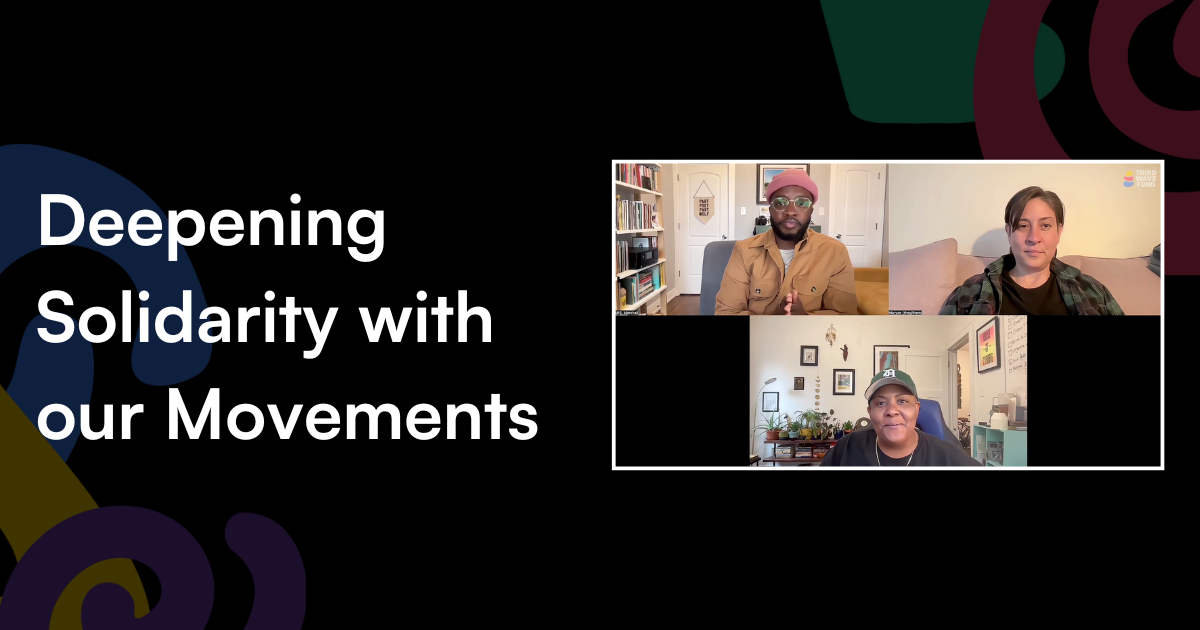An Emergent Strategy Primer—For Funders! With adrienne maree brown
Change is constant. There is always enough time for the right work. Never a failure, always a lesson.
These are just a few of the principles many of us in radical social justice circles and beyond have taken to heart through adrienne maree brown’s book Emergent Strategy: Shaping Change, Changing Worlds. So what does Emergent Strategy look like in the philanthropy field? How can funders put these principles into practice? We are honored to have writer, pleasure activist, and former Third Wave Fund board member, adrienne maree brown, break it down for us!

By adrienne maree brown
In 2017, I released a book that I thought a few people would read. It’s gone further than expected. Emergent Strategy: Shaping Change, Changing Worlds has reached organizers, activists, facilitators, artists, designers, people of all race and class backgrounds, here in the U.S. and all over the world.
For those not familiar, Emergent Strategy (ES) is the way we make moves towards justice and liberation in right relationship with each other and the planet, in right relationship with change, and learning from the great teacher of nature.
Most recently, I am being invited by foundations to give trainings and talks on ES. I am hearing that major donors and program officers are using it. As I listen to how different funders are interpreting the work, I am realizing that some people are getting excited about ES and beginning to use the language while also missing, or misinterpreting, the core lessons.
I empathize - it’s an exciting and massive set of ideas to grapple with - I get humbled regularly. So I thought I'd write this piece to funders looking to experiment with and/or align with ES, and uplift some of the models I see working.
Misconceptions
Some of the most common misinterpretations I hear:
- “Anything goes! Emergent Strategy, right?” In the past few months I have been in conversation with both funders and donors who spoke of processes that were particularly messy in a way that impacted movement workers, and they would sort of shrug and blame ES. ES isn’t an invitation to be messy across class lines. That moves us away from right relationship - what we want is interdependence, where resources can flow in a decentralized way from inequality towards justice.
- “Work for Free/Possible Money!” I was invited into multiple funding processes last year where the expectation was that I would provide a significant amount of time in a “collective” funding process. In a couple of the processes, the money we were working towards had not been secured yet. In each process, there were people with wealth organizing the effort, with good intentions, but seemingly not understanding how much work they were asking for. I have to say that it’s very rare that processes sparked by funders are actually easy or aligned with the processes organizers/organizations would plan for themselves.
- “We are extending trust.” I often hear funders say this when they are choosing to continue to invest in someone who has been problematic in movement spaces and has not yet been accountable, or continuing to work with organizations that are out of alignment with their movement sectors - often because they are willing to contort for the sake of funders. Philanthropists speak to me of the value inside of ES that no one is disposable. This is absolutely the case! But when organizations are working towards healing and funders don’t provide resources in alignment with their accountability process, it makes it nearly impossible to uphold movement accountability.
Core Aspects of Emergent Strategy
Here are some ways to understand the core aspects of emergent strategy for funders:
- Trust the People. Move at the Speed of Trust. ES is fundamentally about relationships - not the often forced and/or transactional relationships of philanthropy, but relationships that are honest about the structures in place, relationships that require authenticity, and that invite learning. Consider starting with small funding, which offers to build trust by working together. Trust is built through lots of small things - conversations, interventions, successes.
- Don’t Drag Movement Momentum. Making organizers jump through hoops to prove their impact and/or unveil flashy new programs every year is a sign that philanthropy is not in right relationship with those it claims to serve. Forcing social justice workers to take on additional work (such as convenings that double as free issue consulting, unpaid selection committees, most grant writing and reporting) is a literal drag on movement momentum.
- But Don’t Rush Us Either. In general, divest from the myth of false urgency. Movements shouldn’t be moving on a timeline that philanthropy sets - the reverse would be a much healthier process. Funders would do well to follow the rhythms of movements. This is true when it comes to trusting movements to move through accountability process and conflict resolution. Offer to support good processes, rather than investing in those people or organizations creating division.
- Pay Attention. Trusting the people means noticing which organizers and groups communities turn to, supporting them and funding the ecosystems that generate them. It means putting the balance of movement resourcing work on those with the balance of the resources.
- Mistakes Bring Growth. Trusting the people means trusting that mistakes and changes in the process will grow the group. This means funding groups for the long term, so they have room to stumble and learn and course correct. It is important that funders are developing trust through mistakes and learning inside of their groups as well, but as often as possible, that learning should not spill over into the work of organizers. When it does, it means that philanthropy is redistributing organizer time to meet the needs of capital. Keep learning, keep trusting, keep growing.
- Trust Boldly. If you can't think of any groups that you would trust to directly distribute your resources in an area you fund, then you've got some work to do around trusting the people, some work to do around building the relationships you have with communities you want to support.
One important tip here is how fractals interact with trust - if a strategy hasn't been successful at a small (local, intimate) scale, it's not likely to work at a large (national, broad) scale. Trust people working over time to cultivate strategies and scale them appropriately. Fund with a fractal strategy - pay attention to groups who are experimenting and growing strategies starting at a small scale. Pay attention to collaborations that start with building relationships and political trust, instead of lofty surface level alliances.
Guiding Questions
Some questions to ask yourself as a funder:
- Am I trustworthy? Can the groups I'm interacting with trust me to be straightforward with them, and to walk with them through their changes? Can they trust that I'm looking for ways to resource them, rather than standing between them and what they need? Am I adding to their momentum, or their workload?
- Is my institution trustworthy? Do we have a set of values that aligns with movements we claim to support? Who does my institution answer to? Can I trust my institution, from the program officers to the board chairs, to take leadership from organizers, people of color, women, and other historically marginalized/attacked populations?
- Does our work sustain the current conditions of inequality, or are we resourcing material shifts that also transform capitalist power dynamics?
Follow those questions into conversations that help you grow.
Emergent Strategy Funding Models
There are many models of emergent strategy in funding - here are a few that I want to uplift:
Auburn Seminary Spiritual Resilience Fellowship - This fellowship was an incredible experience because the Auburn team did their homework, identified movement workers they were excited by, reached out to resource the fellows, and demanded no extra work.
Emergent Fund - The structure of this collaborative fund is movement informed, offers a quick turn around of funds for projects in adaptation, and has a low barrier to entry. This one was actually inspired in part by the book and it’s been incredible to watch it grow and support movements without ego.
Groundswell’s Liberation Fund - This fund is advised by leaders who are women of color and trans organizers, guiding funds to groups they know to be effective and who do “whole people organizing.”
And, of course, Third Wave Fund - They are currently moving a strategy that is a combo of rapid-response (Mobilize Power Fund) and long-term funding, because it's important to move/respond quickly, but also to sustain organizations for the long-haul.

adrienne maree brown is author of Emergent Strategy: Shaping Change, Changing Worlds, Pleasure Activism, and the co-editor of Octavia's Brood: Science Fiction from Social Justice Movements. She is a writer, social justice facilitator, pleasure activist, healer and doula living in Detroit.

.png)
